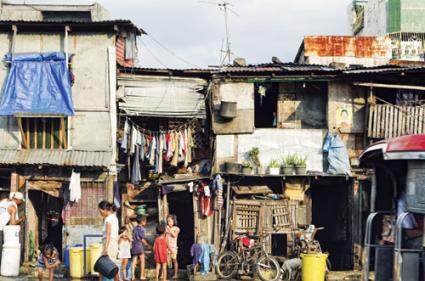Manuel, a semi-illiterate teenager just rescued from the filthy jails of metro Manila, was longing to see his parents and family. He told us that they had no home and lived on the street. They had a food stall near Baclaran Church and lived there under a plastic sheet. They eked out a living selling bananas cooked in recycled vegetable oil and brown sugar to the church goers at the weekly novena and daily masses.

Both rich and poor filled the Wednesday novena prayers. The poor being the vast majority were begging divine help to find enough food for their families, and the rich praying for forgiveness and donating coins for a ticket to heaven. Alas that’s the great divide; the poor trying to live for a few days more, the rich trying to live forever.
Blessed are the responsible well off rich people, the Zacchaeus people of this world who are enlightened and see the social and human reality and are determined to use their influence and resources to change it for the better. They are agents of change and have compassion for the poor, exploited and the abused, and they dedicate their talents, wealth and efforts to change this unjust divide between the haves and have not. But it’s not an easy task.
Trying to make this a more honest, loving and compassionate world where equality and justice reigns is the true goal of Christianity. When Jesus of Nazareth proclaimed that it was coming, the corrupt rich elite called Him a blasphemer and a rebel, a danger to the nation and to their elite status and handed down the death penalty in cruelest way possible. Today around the world, human rights advocates and those committed social workers dedicated to helping the victims of abuse and hardship, work to bring about a just society based on democracy and greater equality. They are vilified and condemned, tortured and killed. Yet more heroes rise up to take their place and carry on the mission.
The irresponsible rich and their followers call such heroic striving and social transformation class warefare, Jesus called it the road to the Kingdom of God where the poorest and their supporters would live in dignity and be the most blessed instead of being despised and cursed. 
In the Philippines there is much to be done to reduce hunger and poverty. In a recent survey made in December 2011, 45 % of those surveyed said they were poor, that’s an improvement from the previous year when 52% said they were poor. Another 36% of those surveyed said they experienced hunger. The Philippine situation still remains “serious” according to the Global hunger index.
There is hope that justice will emerge. The government of President Aquino is fighting corruption, and social welfare secretary Corazon “Dinky” Juliano-Soliman is delivering poverty reduction programs through conditional cash transfers. Cash transfers will ease the hunger for a while and will get more children vaccinated and into school, but they will not change the deeply rooted causes of poverty and hunger in the Philippines. That’s due to the structural inequality in society where 1% of the 96 million people owns 70% of the wealth. The inequality calls for government reform and a program to help the economically poor develop into a strong, dignified middle class with human and civil rights a top priority.
Fr Shay Cullen SSC has been a missionary in the Philippines since 1969.
Support the work of the Columban Fathers - Donate Online
or
Read more articles from the current E-News